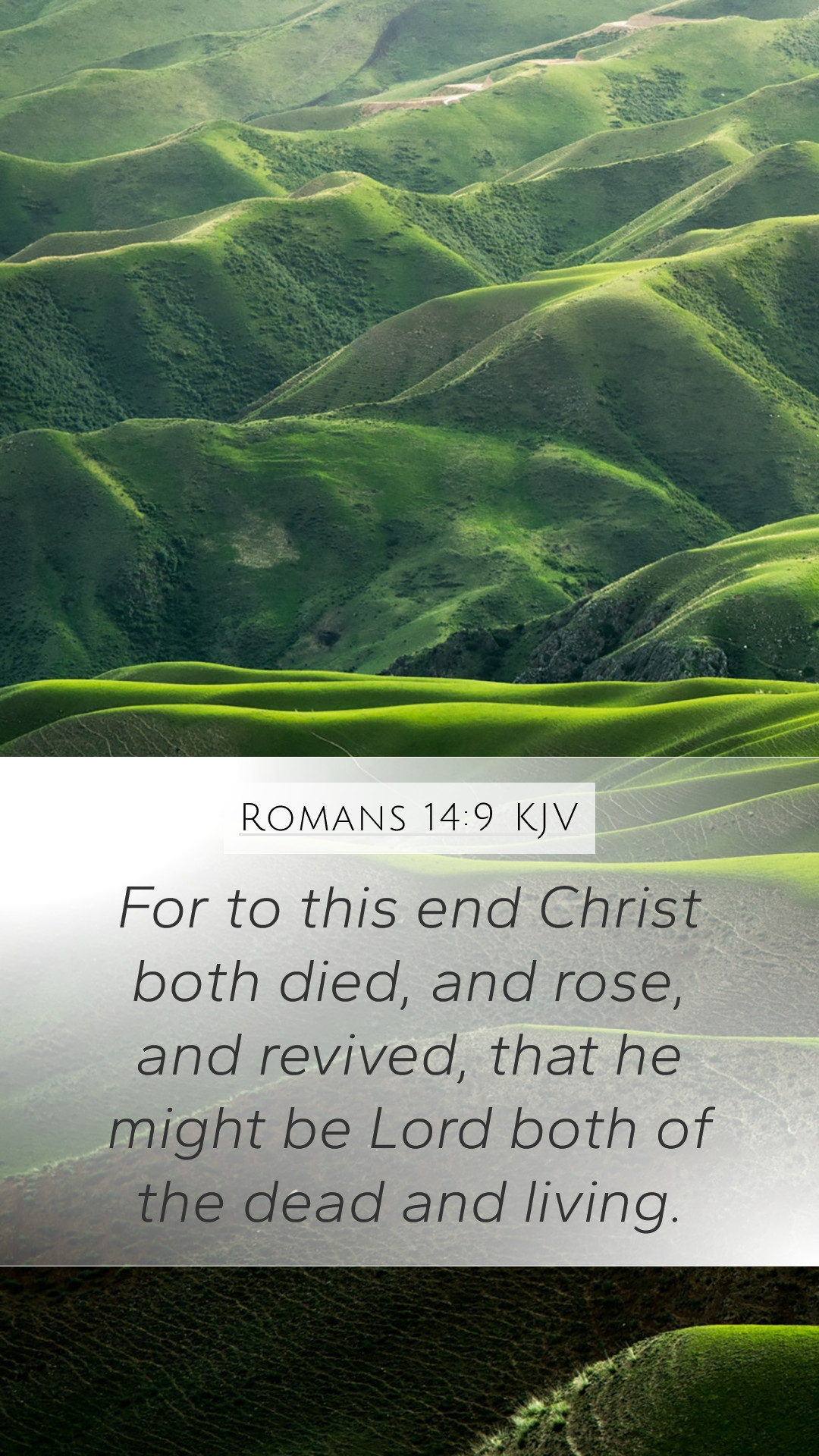Old Testament
Genesis Exodus Leviticus Numbers Deuteronomy Joshua Judges Ruth 1 Samuel 2 Samuel 1 Kings 2 Kings 1 Chronicles 2 Chronicles Ezra Nehemiah Esther Job Psalms Proverbs Ecclesiastes Song of Solomon Isaiah Jeremiah Lamentations Ezekiel Daniel Hosea Joel Amos Obadiah Jonah Micah Nahum Habakkuk Zephaniah Haggai Zechariah MalachiRomans 14:9 Meaning
What is the meaning of Romans 14:9?
For to this end Christ both died, and rose, and revived, that he might be Lord both of the dead and living.
Romans 14:9 Bible Verse Meaning
Understanding Romans 14:9
Romans 14:9 states, "For to this end Christ died and rose and lived again, that He might be Lord of both the dead and the living." This verse encapsulates the significance of Christ's resurrection and His lordship over all creation, both the living and the dead. Below, we explore the meanings and interpretations of this verse using insights from notable public domain commentaries, including those by Matthew Henry, Albert Barnes, and Adam Clarke.
Bible Verse Meanings
The apostle Paul articulates that the purpose of Jesus Christ's death and resurrection was not only for the salvation of humanity but also to establish His authority. This highlights the dual aspect of Christ's reign—as one who transcends earthly life and death.
Bible Verse Interpretations
-
Matthew Henry’s Commentary:
Henry emphasizes that Christ's dominion encompasses all of humanity, signifying that His sovereignty extends beyond just those who are alive. The verse underscores the comprehensive nature of salvation and Christ's authority.
-
Albert Barnes’ Notes:
Barnes notes that the resurrection of Christ affirms His power over death. His lordship is affirmed both for those who are alive (the living) and for those who have died (the dead), assuring believers of their hope in resurrection and eternal life.
-
Adam Clarke’s Commentary:
Clarke highlights the significance of Christ being Lord over both realms as a proclamation of hope. Believers are reassured that death does not separate them from Christ; rather, He continues to reign over all, promising eternal existence for His followers.
In-depth Bible Verse Analysis
This verse invites us to consider several theological themes:
- The Death and Resurrection of Christ: The foundational elements of Christian faith hinge on the belief that Christ's death was a sacrificial act aimed at reconciling humanity with God. His resurrection signifies victory over sin and death.
- The Lordship of Christ: By declaring Christ as Lord over both the living and the dead, Paul reinforces the Christian belief that Jesus holds ultimate authority, providing a basis for worship, service, and hope.
- Implications for Believers: This understanding impacts how individuals live their lives. Believers are called to acknowledge Christ's authority in their daily decisions, emphasizing the relevance of Christian conduct in a world that often challenges faith.
Significance of Romans 14:9
Grasping the implications of Romans 14:9 allows a deeper appreciation of the integral message of the Gospel. The verse signifies how the resurrection not only assures personal salvation but also unites all believers under the lordship of Christ, highlighting community and shared faith.
Application of Romans 14:9 to Daily Life
Reconciling ourselves with the truth that Christ reigns over all encourages us to lead lives reflective of His teachings. Individuals are challenged to support one another through love and understanding, joining together as a community of believers under Christ’s lordship.
Related Cross References
- Philippians 2:9-11: Highlights that God has exalted Christ and given Him a name that is above every name.
- 1 Corinthians 15:20-22: Discusses the resurrection as the firstfruits, giving hope for the resurrection of all believers.
- Romans 6:9: States that Christ being raised from the dead dies no more; death no longer has dominion over Him.
- John 11:25-26: Jesus declares that He is the resurrection and the life, affirming eternal life for those who believe in Him.
Conclusion
Romans 14:9 invites an exploration of deep theological truths that enrich personal faith and community practices. By recognizing the significance of Christ’s death and resurrection, believers are encouraged to embrace their identity as members of a body that is under His sovereign lordship. As a cornerstone in understanding Scripture, this verse serves as a catalyst for deeper Bible study insights, guiding Christians towards meaningful applications in their daily lives.


